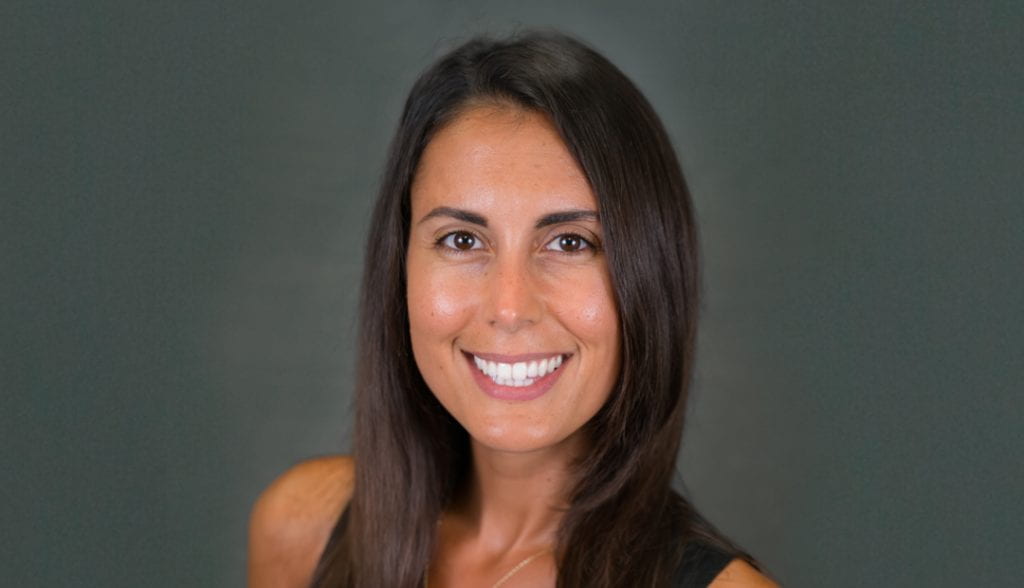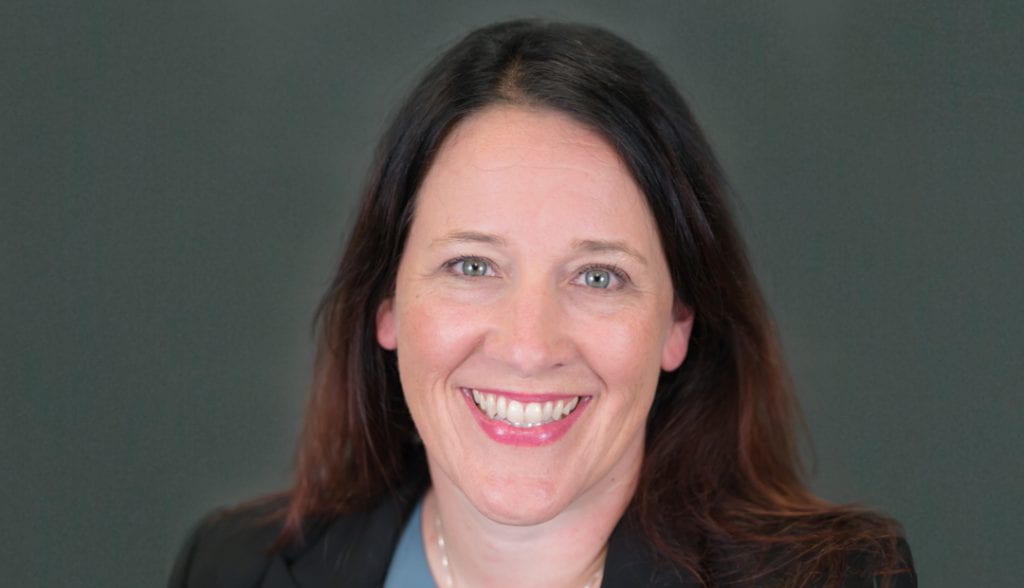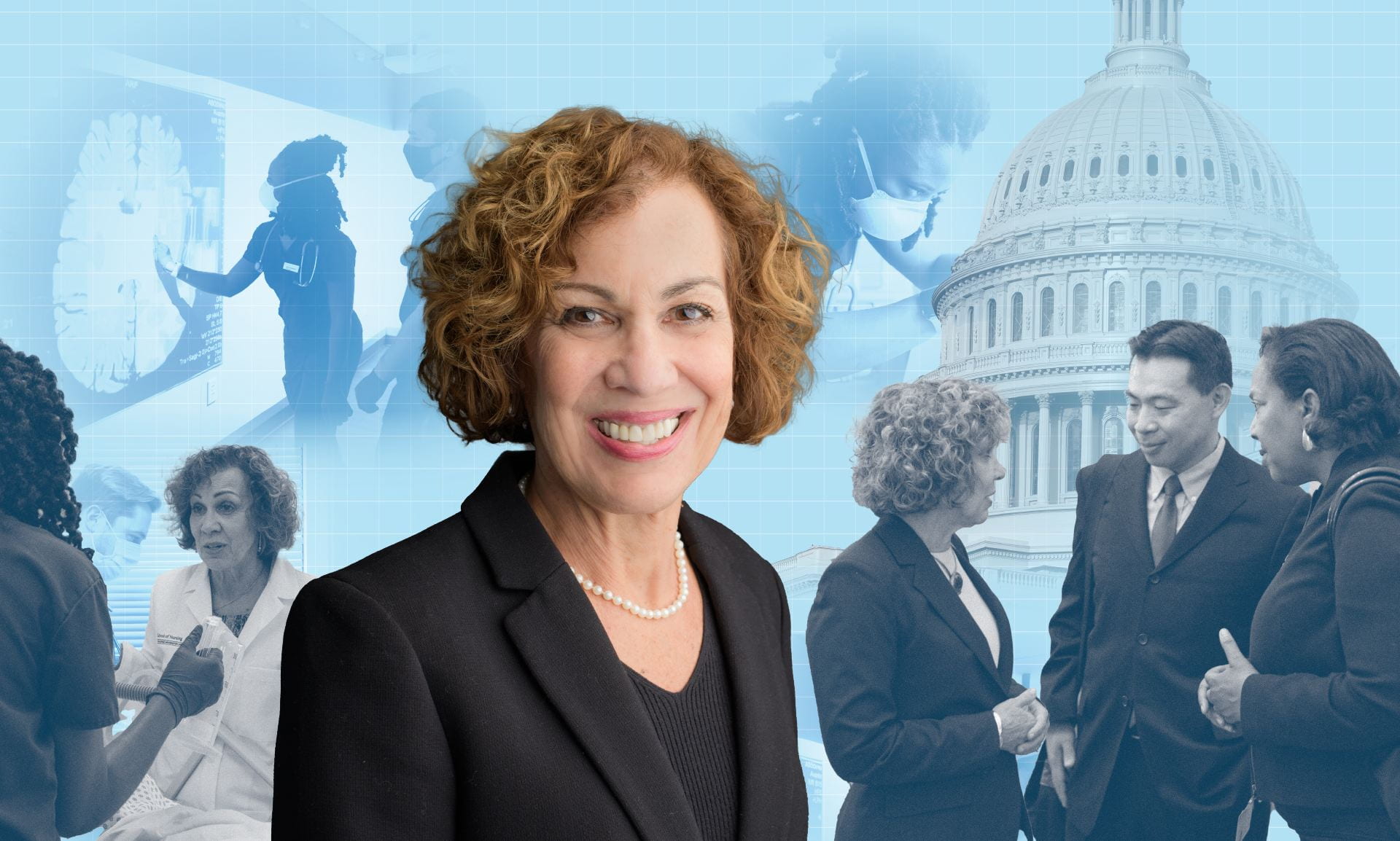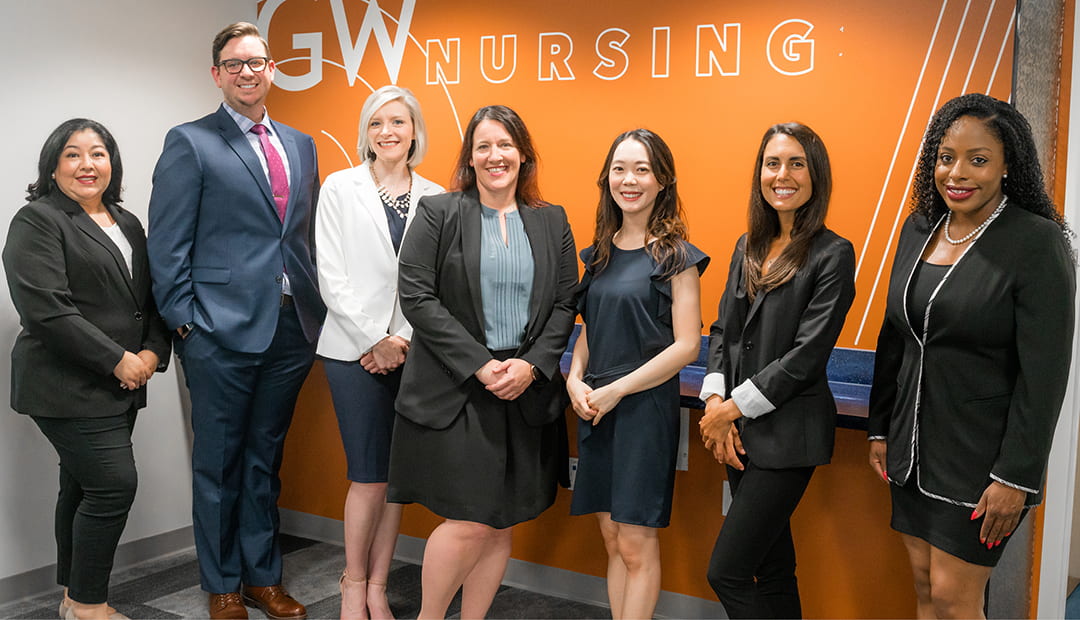As they undertake research they hope will translate to better patient outcomes and health care practices, GW Nursing’s first-ever Doctor of Philosophy in Nursing students are setting a high bar for those who will come after them.
The Ph.D. program launched in fall 2019. Although GW Nursing had already offered a doctoral-level degree–the Doctor of Nursing Practice (D.N.P.)–the Ph.D. program aims to prepare students interested in nursing science and education.
“Upon graduation, a nurse scientist will address research questions that are most relevant to the care of patients, educational needs of students and policy goals of our profession,” said Kathleen Griffith, Ph.D., M.P.H., CRNP-F, assistant dean of the Ph.D. program and newly minted associate dean for research. “Nurses study clinical problems that we are in a unique position to manage–such as symptom management, family distress and decision making around preventive health care. The purpose of our research is to build the knowledge base of our profession, which will enhance our care of patients, improve education of our students and change the way health care is delivered.”
Eleven students, each with a range of experiences in nursing and health care, are currently enrolled in the three-year, full-time 57-credit program, which is delivered in an executive-style format.
The six students in the first cohort are now completing their core coursework; the second cohort, with five students, started in fall 2020. A third cohort will have an orientation in July and begin studies in the fall semester, Dr. Griffith said.
First cohort students Michelle Clausen, M.S.N., CNM, and Noelle Herrier, PMHNP, have centered their research on improving outcomes for two populations that too often slip through the cracks.

After earning her undergraduate degree in public health from GW and then working at a Washington, D.C., area health-focused nonprofit, Clausen returned to GW, first earning a B.S.N. and then an M.S.N. with a concentration in nurse-midwifery.
She started her nursing career as a Midwifery Fellow and then as a full-time faculty member at the midwifery service at GW Medical Faculty Associates. These roles also came with the opportunity to teach students–from those in medical and nursing school to emerging midwives and medical residents—which has become another passion for Clausen. Since beginning her Ph.D. studies, Clausen has continued to work clinically as a nurse-midwife for the University of Maryland.
Clausen’s clinical experiences motivated her to return to school and is the inspiration behind her research focus.
“I have witnessed the system fall short for women and pregnant persons,” she said. “I’ve seen barriers that certified nurse-midwives have faced in providing high-quality, evidence-based compassionate care, despite this type of care continuously providing significant outcomes.”
On the other hand, she has had the opportunity, through mentors and other experiences, to see midwifery at its very best.
Clausen’s research interests include matters related to the nation’s growing maternal morbidity and mortality rates; barriers to access to care; innovations in women’s health; and the vast spiritual needs of pregnant individuals. She is now focused on testing spiritual needs assessment tools with pregnant women.
“Spiritual health has been studied throughout medicine and associated with various positive health outcomes, and I would like to help bring this to those experiencing pregnancy,” she said. “It is my hope that this work informs future research regarding the dynamic needs of pregnant individuals in order to improve their health and the health of their families.”

After 13 years in clinical practice, Herrier has returned to school, hopeful that she can play a greater part in eliminating the health disparities common among mental health patients.
Though her undergraduate degree from Northern Arizona University is in zoology, Herrier minored in chemistry with an emphasis on health professions. She returned to school to earn a B.S.N. from Arizona State and then an M.S.N. in Adult Psychiatric Mental Health Nurse Practitioner at the University of Washington. There, Herrier did much of her training at Madigan Army Medical Center, focusing on the neurobiology and treatment of trauma. She now works at a Maricopa County, ArIzona, facility, providing court-ordered evaluations and treatment for those with mental health concerns.
Her nursing career started in cardiac ICU, but mental health was always Herrier’s passion; she made time to pursue it by working with community mental health initiatives and at inpatient behavioral health facilities.
“Throughout my career, I found that there were many barriers to my patients receiving medical care, from their psychiatric illness to their social and living situations, and I’ve even witnessed provider bias in delaying treatment,” she said.
Herrier wants to use her Ph.D. to help change that. She says symptoms of other diseases are often overlooked in mental health patients, something that was underscored this past year, she says, as mental health patients with severe coughs were tested for COVID-19 only to discover they had advanced lung cancer.
“The understanding that people with a serious mental illness have higher rates of mortality from cancer than those without a mental illness led me to want to research to find methods to decrease people’s mortality,” said Herrier, whose post-doctoral aspirations include joining the faculty of a university to teach and continue her research.
Cohort 2 students Sasha DuBois, RN, M.S.N., and Burton Korer, RN-BC, D.N.P., CPHQ, have designs on using their research to change the health care industry for the better.

DuBois was in high school when she first came to work at Brigham and Women’s Hospital. Today, she is a nurse director for the hospital’s IV team and Patient Care Assistant Float Pool.
“I started out through the Student Success Jobs Program for Boston students who were interested in health careers,” said DuBois, who joined the hospital’s nursing staff after earning a B.S.N. at Simmons University.
She received her M.S.N. in leadership and administration from Emmanuel College; she’s pursuing her doctorate because she believes it will be a valuable asset in her goal of addressing the dearth of diversity and cultural competency in nursing.
“Ensuring we have racially and culturally concordant providers of our patients is a very important passion of mine,” she said. “My research interests around this subject are focused on barriers that nurses of color face when completing a professional nursing program.”
For DuBois, nursing is more than a profession, it’s a calling that beckoned to her early on. The pandemic, she says, has shown the world once again how critically important nurses are. She’s never been prouder to work in the field.
“I love what makes a nurse, a nurse,” DuBois said.
She’s determined to leave a mark: to make nursing better by working to knock down barriers that impede both nurses and patients. DuBois has begun that work already by volunteering at Simmons University in the Dotson Bridge and Mentoring Program, which supports African American, Latina, Asian and Native American nursing students.
“I believe that there is room for everyone at the table,” DuBois said. “I plan to continue my career in nursing leadership while working in academia. I can do my part to bridge the two worlds, so I may contribute to the development of the best nurses for tomorrow.”
The COVID-19 crisis has brought the vulnerability of older adults to the forefront, but Dr. Korer says this population was in a precarious situation long before the pandemic. He enrolled in the Ph.D. program to help change that.
“I see many elderly low-income individuals at risk due to declining health and limited access to coordinated and effective care,” he said. “My aim is to help develop nursing practices to address elderly individuals who are aging in place in senior housing.”
Years of study and practice led him to his research focus. He worked continuously in health care as he earned his A.D.N. from Gateway Community College; B.S. in business administration and management and M.S.N. from University of Phoenix; and D.N.P. from GW.
“Starting as a CNA, then an LPN, I have been employed in nursing full time for over 30 years, working for several large employers, and have owned my own health care company for more than 25 years,” he said.
Dr. Korer believes one of the first steps in delivering better health outcomes for older adults and others is to ensure the right programs and initiatives are properly funded and utilized.
“The health care system in the United States currently covers many social costs as compared to other countries (but doesn’t) always produce favorable health care outcomes,” he said. “If we can spend the resources better we can improve the lives of many more individuals.”
After completing the program, Dr. Korer wants to share what he learns about fiscal performance and health care outcomes through teaching, lecturing and partnerships with hospitals and other health-focused organizations.
AUTHOR kevin walker

